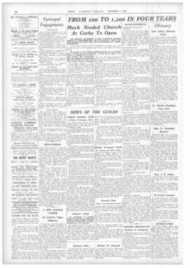Page 4, 4th November 1938
Page 4

Report an error
Noticed an error on this page?If you've noticed an error in this article please click here to report it.
Tags
Share
Related articles
Annuals And Tales
For Those Who Like To Relax (novels)
Films By Grace Conway Pirandello Encouraged By The Recep...
A Shocking Finale
Films By Grace Conway War-blindnessand A Pirandello
Fic-tion
Short Stories Of Pirandello
Dignity And Depth To Personality
A Character in Distress. By Luigi Pirandello. (Duckworth, 7s. 6d.)
Dr. Bradley Remembers. By Francis Brett Young. (Heinemann, 8s. 6d.) The Younger Venus. By Naomi Royde Smith. (Macmillan, 7s. 6d.)
Swept and Garnished. By Donald Armour. (Laidlaw, 4s. 6d.)
Like Water Flowing. By Margaret Mackay. (Harrap, 8s. 6d.)
Reviewed by FRANCIS BURDETT IT is curious that whilst the plays of Pirandello should be universally known and famous, his stories, some of which have just been published in English for the first time, have received little notice.
Nineteen of his stories are to be found in A Character in Distress. Short, for the most part, pithy, and filled with a sardonic and even macabre humour, they are singularly convincing and perfectly told. They are evidence, if such were needed, of the almost perverse insight that Pirandello exercised into the lives of his fellow human beings. He understood the complexities of human existence and never do we feel that he distorts humanity in spite of his emphasis on the unconsciously humorous or grotesque.
Occasionally, as in Sicilian Honour, for all the tragic humour, there is a profound awareness of the dignity and depth of personality. But more often he delights to shock by unsparingly revealing foibles and frailties and self-deception. His characters are Sicilians and Italians, and he throws considerable light on their idiosyncrasies.
Mr. Brett Young, in Dr. Bradley Remembers, has written a hook that describes minutely, and in almost too leisurely a fashion, the life of a general practi tioner.
It is a meticulous description, almost photographic in its detail, of what such a life means. Drudgery, routine, unending self-sacrifice and self-discipline, rewarded very largely by book debts that the patients can never pay. But, for a man like Dr. Bradley, there is the consolation and reward of a life of endless helpfulness
to others. When his own private life seemed ruined beyond repair by bereavement and domestic sorrow it was his work that saved his sanity and the love of his patients that eventually came to mean (Continued in next column.) more to him than anything in the world. It is well that this side of a doctor's life should be stressed. and Mr. Brett Young has done it exceptionally well.
Miss Royde Smith was asked to write a "happier tale" and imagined The Younger Venus. It is a very pleasant phantasy woven round the personalities of Susan Addcrley and Anthony Frome. They do not meet until the conclusion of the story, but fate or chance, or, it may be, just the creative imagination of the author has so arranged it that they are for ever meeting in imagination before they ever met in fact. Anthony had written persuasively about Botticelli and Simonetta. Susan, who all unconsciously resembled her and so the Botticelli Venus, comes across the book and succumbs to its charm. Anthony, for his part, who had no knowledge of the Adderleys, had taken for a year their country house and found upon the study table a photograph of Susan that she, impulsively and in a moment of grief at having to leave the house, had put
there. It was the girl's resemblance to Simonetta that first attracted him. it fired his imagination and that fire was mysteriously fanned by emanations, as it seemed, of her presence about the house. So it was that each, in imagination, blindly groped their way towards the other. The unscrupulousness of a step-father wrought both a crisis and a meeting.
Some readers may think that the author of Swept and Garnished has dealt a little hardly with the admirable and, as it seemed, prosperous Vicar of St. Kestrel St Luke. The Rev. Robin Blandford had all that Fr. Damian lacked. Education, culture, a famous and beautiful church, a devoted wife and children. His fault, that passed almost, or quite, as a virtue to himself and others, was his scepticism and dis
like of " mediaeval superstitions." He mocked, in fact. at what his church had been built for and at those who had built it. But such a dismissal of the past was strangely and awfully rewarded. Terrible things took place: blasphemy, almost unnoticed, at evensong, followed by murder and the sight of his younger daughter hanging from the church tower, Worse was to follow, and no one understood except poor Fr. Damian. He, at least, in spite of his uncouthness, still believed both in God and the devil and could, when driven to it, call on his priestly powers for exorcism and release.
It is a tale in which horror is skilfully conveyed and a profound though forgotten truth underlined.
Miss Mackay, the author of Like Water Flowing, has an intimate knowledge of China, and there are many beautiful descriptions of scenery and people in the hook. It tells of an Eurasian girl. Her father, originally in the American diplomatic service, had married a Chinese woman. Linda had no characteristic marks in her appearance to show that her mother had been Chinese. But this only added to her difficulties so that in the cild she felt bitterly frustrated, belonging neither to East nor West.
It is a delicate portrait and deals with a subject of great importance. The picture of the father, upright, studious and devoted to his children, yet never able to forgive himself the wrong he has done them, is memorable.
blog comments powered by Disqus

















